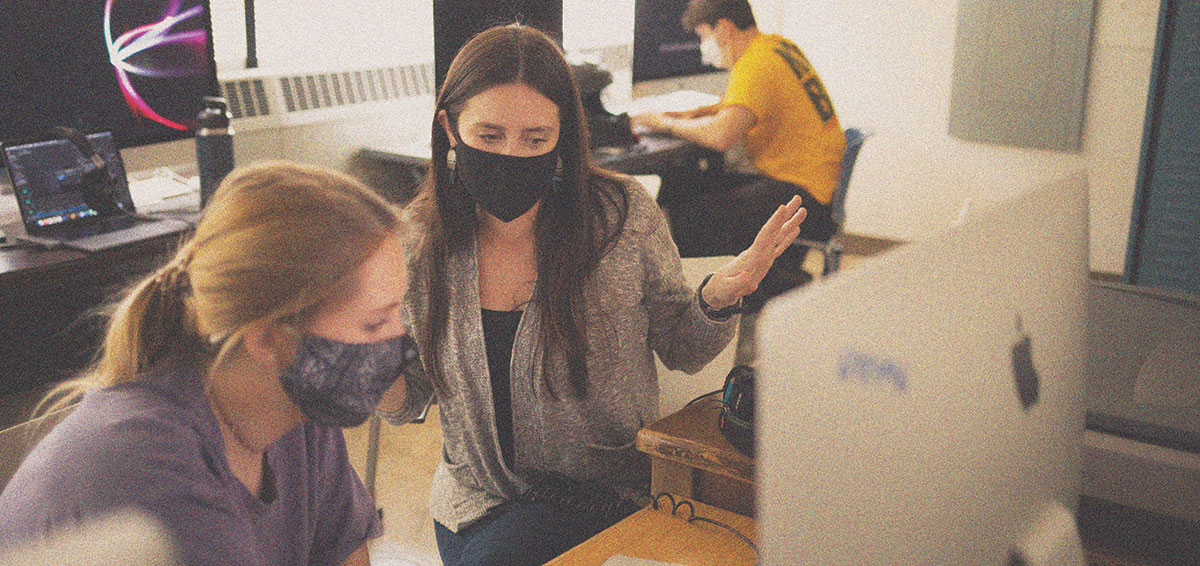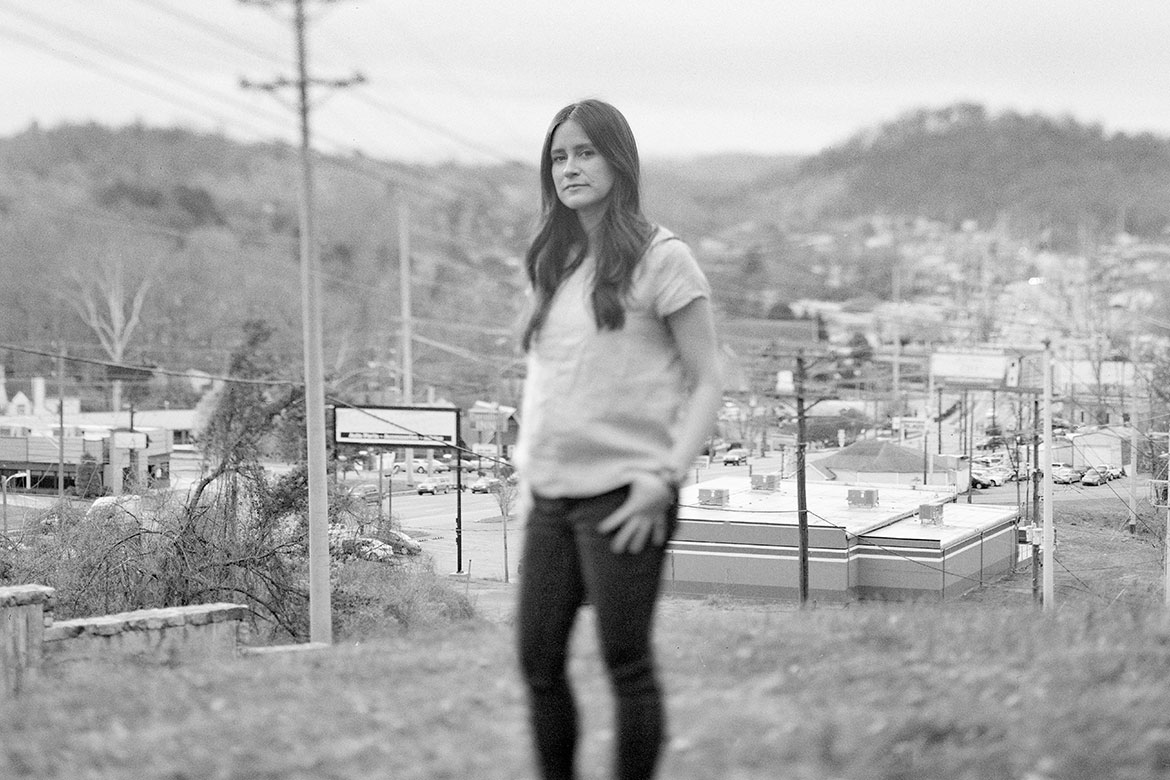Elaine McMillion Sheldon was never supposed to go back home. At 18, she was off, like so many other young Appalachians, to somewhere else—a bigger city, a better opportunity. “I didn’t see any future for myself in West Virginia,” Sheldon says. “I couldn’t wait to get out.”
As a girl, Sheldon had spent entire days exploring the hollow in Nicholas County, West Virginia, where for eight generations her family has lived. With her Talkgirl cassette tape recorder in hand, she launched faux investigations, filling journals with notes and peppering her parents’ dinner guests with questions. The few times the TV was on at home, she studied Katie Couric and Oprah. They were in New York and Chicago, not Appalachia. So that’s where she was going—places far away from the coal mines where her grandparents and uncles worked, where her brother and cousins still work today. “I imagined myself working for some place like the New York Times, in their video unit or abroad,” she says.
 Her first stop was West Virginia University in Morgantown, about a two-hour drive from the family farm. After graduation, she left for Boston to complete her MFA at Emerson College. And that’s when she was confronted with the image of West Virginia from the outside, the image her classmates joked about when they met her and asked about home. Watching coverage by journalists who had never spent more than a few days in the region, she saw the narrative perpetuated for the rest of the country. Those poor people. Who is going to save them?
Her first stop was West Virginia University in Morgantown, about a two-hour drive from the family farm. After graduation, she left for Boston to complete her MFA at Emerson College. And that’s when she was confronted with the image of West Virginia from the outside, the image her classmates joked about when they met her and asked about home. Watching coverage by journalists who had never spent more than a few days in the region, she saw the narrative perpetuated for the rest of the country. Those poor people. Who is going to save them?
The longer she was away from home, the more Sheldon realized she had to go back to tell the story right.
“You’re either the type of person who gets embarrassed and tries to disassociate yourself from the place, or you fight back,” Sheldon says. “And I think there’s a lot of young Appalachians who don’t really feel like fighting for the region anymore.”
In 2013, Sheldon released her first notable film, Hollow, an interactive documentary about the everyday lives of residents of McDowell County, West Virginia—once a thriving coal county, now among the country’s most rapidly declining by population. She had filmed Hollow as an MFA student and it won her a Peabody Award, her first major honor. Years earlier, Sheldon had been part of the youth exodus out of West Virginia. But now she had returned. With the last words of her Peabody acceptance speech, she announced “This is for Appalachia.”

In 2017, Sheldon’s Netflix short documentary Heroin(e), about three women—a judge, a missionary, and a fire chief—combating the opioid epidemic in Huntington, West Virginia, earned an Emmy award and an Oscar nomination. A year later, Netflix also produced her full-length documentary Recovery Boys, about the lives of four men in an inpatient substance abuse treatment program on a West Virginia farm. In the years since she returned to Appalachia, Sheldon has accumulated accolades for her storytelling, including multiple Emmy nominations, a Guggenheim Fellowship, and inclusion in Southern Living’s “50 People Changing the South.”
In June 2020, Sheldon moved to Knoxville to join UT’s faculty at a pivotal moment. The Cinema Studies program, previously an interdisciplinary program in the College of Arts and Sciences, had just moved into the School of Art, where it is being offered as a four-year Bachelor of Arts degree.
“We’re investing in the longterm stability and growth of the program,” says Paul Harrill (’94), co-chair of the Cinema Studies program. Sheldon’s arrival, he believed, would build an even stronger foundation for cinema studies than had existed before. During her interviews, Sheldon had asked herself: Do I have a place here? The answer from Harrill and his School of Art colleagues was yes. She’d come in at the ground level and teach the art of nonfiction to students across disciplines— filmmakers, studio artists, journalists, poets—in a region she has dedicated her career to advocating for. It’s a region many of her students also call home, where the university, just as deeply rooted, is bringing together people like Sheldon looking to tell a different story of Appalachia.
“We have an opportunity here to tell stories that go unnoticed.”
“We have an opportunity here to tell stories that go unnoticed,” Sheldon says. The ones of resilience and overcoming and everyday life: motorcycle racers, square dancers, young people asking, as Sheldon once did, whether to stay or go. “My students will have a long journey ahead of them. But my hope is that they remember Appalachia is a place rich with stories worth telling.”
Family Legacy
On November 20, 2014, three weeks before her Hollow acceptance speech at the Peabodys, Sheldon’s mother texted her a photo of a yellowing sheet of paper with a handwritten family tree her great-uncle Roy had made years earlier. The names dated back to the 1770s.
“These roots run deep: my family tree,” Sheldon titled the post on her blog that afternoon.
As Sheldon documents Appalachia today, her great-uncle, who is 94 years old, documented the history of their family as they transitioned from farmers into coal miners over a hundred years. In 2018, Sheldon and her husband, Curren Sheldon, with whom she frequently collaborates, filmed the music video to “Summer’s End” by the late John Prine. Much of the shooting took place on the family farm, with her grandfather and cousins as the principal actors.
“When I started hanging out with Elaine and seeing what she was doing with Hollow, and how she was really responding to the representation of people in Appalachia and West Virginia for decades and decades, I was just struck by the care she had for the place, the care she had for the people,” Curren says.
Curren served as director of photography and producer for Heroin(e). The camera helped serve as his shield during some of the most difficult scenes. When a young woman suffered an overdose on a convenience store floor, her friends distraught in the next room as paramedics rushed to save her, his job was to focus on the shot. But Sheldon, who was running sound, did not have that protection. She had to see and experience everything around her.
“Elaine, being so attached to the region, she sees her family and her friends in everyone who we meet and film,” Curren says. A struggling coal miner, someone trapped in addiction—“For people in West Virginia, these are lived experiences.”
In 2019, Sheldon collaborated with NPR reporter Howard Berkes on Coal’s Deadly Dust, an investigative documentary about severe black lung disease among West Virginia coal miners for the PBS series Frontline. Nominated for a Writers Guild of America award and two Emmy awards, the film was a harrowing experience for Berkes and Sheldon, who had spent their time speaking to and earning the trust of men who had watched brothers, fathers, and grandfathers suffocate to death with black lung— the same disease those men now carried in their lungs.
“It’s hard not to look at these guys and be really worried for your family,” Sheldon says. And that quality—her empathy for the people she films—may ultimately be what makes Sheldon so remarkable a filmmaker at the age of just 33.
“If I were a student today,” says Berkes, “and I were thinking about what it takes to be a filmmaker or a journalist, I would sit at the knee of Elaine McMillion Sheldon.”
Young Voices
Before the start of her first semester, Sheldon surveyed her students to learn more about where they were coming from. Many were from small rural and Appalachian communities. Most were Tennesseans, some from mountain towns scattered across the eastern part of the state. They reminded her of herself all those years ago, deciding to leave home for the big state university.
“People think you have to choose a smaller university to have one-on-one relationships with your professors,” Sheldon says. “You feel like you’re going to get swallowed up. But that wasn’t my experience at all.”
In the smaller intimate settings of the School of Art classes, she could develop relationships with students with whom she shared a story. “I remember being 19 and insecure about my career path and having to justify it to my family,” Sheldon says. “It takes a lot of hard work to get on the other side of that dream.”
Sheldon was open about her own work, showing her films in class, dissecting them, and allowing students to provide their own feedback. She is still finding her voice. It’s a process; the finish line, as an artist, isn’t intended to be clear.
“She pushed me on every project,” says Elliot Childress, a sophomore cinema studies major from Jonesborough, Tennessee. She challenged him to look introspectively at himself and his work, to ask What are you best at, and what do you want to put out there for the world to see? One of his class projects, an experimental short film about the dystopian evolution of science, was screened at the School of Art’s Handheld Film Festival. “I had no idea I could make something like that until her class.”

Ashley Dailey, who graduated with an MFA in creative writing in May, hadn’t worked a professional camera before taking Sheldon’s class. Like Sheldon’s family in West Virginia, Dailey’s has lived in the same small rural community in Georgia for five generations. During the semester, Sheldon and Dailey spoke often about the complexities of writing about rural life in the South without stereotyping. “I feel the same about my family as Elaine does hers,” Dailey says. “You go to college to become more educated, and it creates a distance.
“You want to respect the generation before you that didn’t get the opportunity you did,” she says. “You want to honor them and their history as people when you portray them.”
For her PhD program applications over the winter, Dailey included several video poems produced in Sheldon’s class as part of her portfolio. “I’m ambitious, but I don’t think I would’ve been brave enough to do what I did without her challenging me,” she says. Dailey will attend the creative writing program at the University of Southern California as a PhD student in the fall.
Talking about a documentary she’s planning to film over three weeks in Haiti this summer, Chloe Baker, a sophomore 4D studio art major from Knoxville, confided in her one-on-ones with Sheldon, “I’m 20 years old. I’m not equipped for this.”
Sheldon’s response: You’re talking yourself out of it before you pick up a camera. You’re fully equipped. I believe in you. Maybe Baker will be the only person to ever tell the story. To approach it with humanity and empathy. To get it right, as Sheldon has been trying to do for nearly the past decade.
“To know you’re learning from someone who believes in you and wants something for you as badly as you want it for yourself—that’s the best thing I’ll ever remember from college.”
While managing her new duties as a professor, Sheldon continues to work on her film King Coal, a magical realist documentary about what life in Central Appalachia may look like after coal. Even though she is no longer in West Virginia, she keeps a photo of the family farm she explored as a girl as her Zoom background.
Those days, she could’ve never imagined staying. Or that she would become someone uniquely positioned to share the stories of Appalachian resilience with the world. “For many Appalachian people, the virtue of choosing to stay here is a radical act,” Sheldon says.
There are young kids all over the region, Sheldon imagines, who are like her. They never expected to see a filmmaker out of West Virginia or eastern Kentucky or Tennessee compete for an Oscar.
In a 2009 interview, Sheldon—still a student at WVU—said, “In the end, it’s about how bad you want something.”
Twelve years later, the same message applies.
“If I can show people what can be done here,” Sheldon says, “maybe that will empower and encourage them to believe they also have a future here if they stay.”


4 comments
Powerful story
Living her dream and never forgetting her past.
More evidence against Thomas Wolfe. She went home, told the stories, made it better in the telling.
Really great story.
Comments are closed.